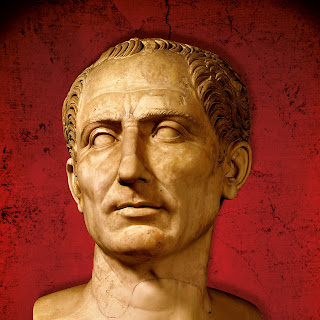"I love the name
of honor more than I fear death."
At the age
of 25, Julius Caesar had won praise for his oratory. Many saw him as an
up-and-coming politician in Rome. Life was good. His wife Cornelia had just given
birth to their first child Julia.
Shortly
after she was born, Caesar sailed to Rhodes, an island in the Aegean Sea, to
learn more about the art of speechmaking under Apollonius, a rhetorician who
had taught the great Roman senator Cicero.
It was the
beginning of winter in 75 BC, but Caesar did not make it to Rhodes.
Cicilian pirates kidnapped him and held him on an island of
the coast of southern Turkey north east of Cyprus in the Aegean Sea.
The pirates
were not necessarily from Sicily. Bands of these sea-going thieves had roamed
the waters of Aegean for decades. The Romans tolerated their presence partly because
they were elusive and partly because they supplied Roman senators with slaves they
put to use on their plantations.
"Burst out laughing"
The pirates
gave the young nobleman a choice: Be sold as a slave or accept being held for
ransom. When they told Caesar they would demand 20 talents of silver (roughly $600,000
in today's money), he "burst out laughing." So records the Greek
author Plutarch in his "Life of Julius Caesar" (as translated by
Robin Seager).
Caesar then told them that they had
absolutely no idea who he was and how valuable a prize he was. He doubtless
informed them that his family was of royal lineage and that he was a descendant
of Iulus, the son of Aeneas, the legendary Trojan prince and warrior.
Incredibly,
instead of begging for mercy as most captives would have done, Caesar told
these "bloodthirsty" pirates that he was worth 50 talents and that he
would have that sum delivered to them. They most happily agreed, and Caesar
sent most of his traveling companions back to sea, telling them to return with
that amount. He kept with him only a friend and two slaves.
For the
next 38 days, Caesar lived among the pirates as if he had not a care in the
world—"with the greatest unconcern" as Plutarch says, for if his
friends did not return, the pirates would surely kill him. He played games with
the pirates and exercised with them.
He had the
audacity to act as though he were their leader, not their prisoner. When he was
tired and wanted to sleep, he would tell them to shut up. When he made speeches
to them and read poems he had written to them and they failed to be impressed,
he mocked them, calling them "illiterate savages."
With much
amusement, Caesar often told them that he would have them all put to death, if
he had the chance. They pirates found all of his high handed talk comical,
attributing it to his youthful brashness.
When
Caesar's friends returned with the ransom, the pirates did as they had promised
and freed him. He immediately set sail for the nearby city of Miletus in
present day Turkey. Once there, even though Caesar held no military rank and
was not a Roman official, he immediately assembled several ships and manned
with them sailors willing to confront the pirates.
True to his word
Returning
to the place where he had been held captive, he found the pirate's ship
anchored off-shore. He captured most of the barbarians. He also got back the 50
silver talents.
He took the
pirates to Pergamon, another coastal city in modern Turkey, where he had them
imprisoned. Before he could have them put to death, he needed the permission of
Marcus Juncus, the Roman governor of Asia. Learning that he was not there but
in nearby Bithynia, he sailed there.
Juncus
refused Caesar's request. He told him that as governor he had the right to sell
the prisoners as slaves, and after doing so, he would keep all of the proceeds
himself.
This was
not what Caesar wanted to hear. He rushed back to Pergamon before the
governor's men could arrive to seize the prisoners. True to his word, Caesar
removed the pirates from their cells and had them crucified, just as he had
told them he would do. Because
those being crucified typically spend several agonizing days suffering on their
crosses, it is believed that Caesar may have shown them mercy and slit their
throats instead.
Caesar bowed
to no man. As Shakespeare would have him say, "I love the name of honor
more than I fear death."
MORAL: Have a sense of humor. And beware of those who smile



No comments:
Post a Comment